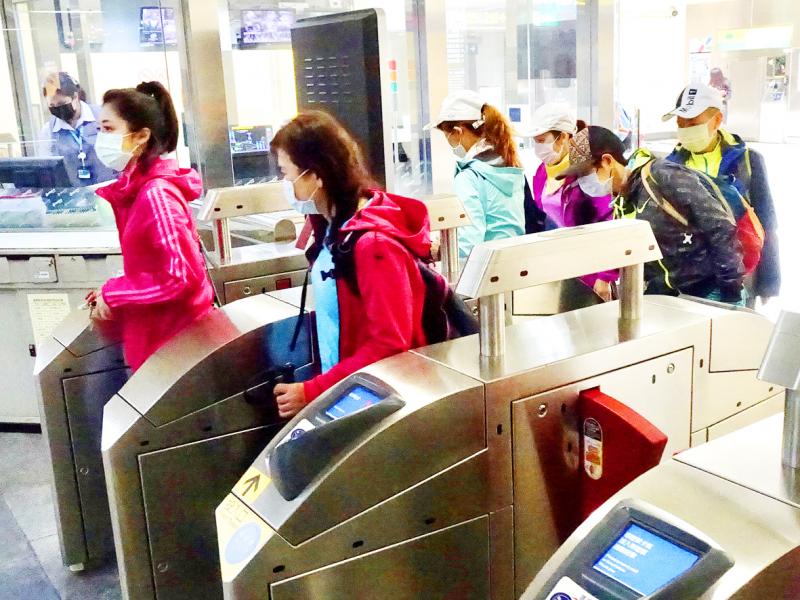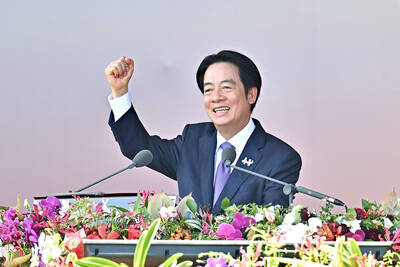People who refuse to wear a mask on public transportation after being asked to do so would face a NT$3,000 to NT$15,000 fine, effective immediately, the Central Epidemic Command Center (CECC) said yesterday after announcing nine additional COVID-19 cases.
In a move to curtail the spread of the novel coronavirus, the Ministry of Transportation and Communications on Tuesday announced that people must wear masks on trains and intercity buses, while Minister of Health and Welfare Chen Shih-chung (陳時中), who heads the center, on Tuesday said that people should wear them when they cannot maintain a social distance of 1.5m indoors.
Chen yesterday added that the government would fine those who do not wear masks on public transportation after being asked to, citing the Communicable Disease Control Act (傳染病防治法).

Photo: Tu Chien-jung, Taipei Times
Service personnel at Taiwan Railways Administration and High-Speed Rail stations from Tuesday have been directing people to convenience stores to buy masks if they do not have one, said Deputy Minister of the Interior Chen Tsung-yen (陳宗彥), who is also deputy head of the center.
Fines on local buses and MRT systems would be handled by local governments, while those on nationwide systems would be managed by the transportation ministry, Chen Tsung-yen said.
The center would ask the transportation ministry to negotiate with local governments over which party is to be responsible for fines issued on buses that operate across municipalities, he said.
Later yesterday, the Taipei City Government said in a news release that it would follow the center’s instruction to implement the policy immediately.
Meanwhile, the CECC yesterday reported nine additional cases of COVID-19 — seven imported and two locally transmitted — bringing the nation’s total to 348.
The imported cases, five women and two men, are all Taiwanese who had traveled to Austria, the Czech Republic, Denmark, Thailand, the UK or the US before returning to Taiwan between March 14 and Wednesday, CECC data showed.
One of the two locally transmitted cases was No. 343, a woman in her 60s who developed symptoms on March 20 after her husband on March 17 returned from the US, Chen Shih-chung said.
The CECC would test her husband for the virus to clarify the transmission path, he said.
Case No. 347 is a woman in her 40s who had contact with case No. 336, a female security guard for an apartment complex in northern Taiwan whose case was reported on Thursday, the data showed.
The security guard transmitted the virus to the woman, a resident in the complex, possibly because the two had chatted without wearing masks, Chen Shih-chung said.
It might not be necessary to reveal the location of the residential complex, as the CECC has all the footage from its surveillance cameras, which helped clarify the guard’s contact history, he added.

The Ministry of the Interior (MOI) is to tighten rules for candidates running for public office, requiring them to declare that they do not hold a Chinese household registration or passport, and that they possess no other foreign citizenship. The requirement was set out in a draft amendment to the Enforcement Rules of the Public Officials Election and Recall Act (公職人員選舉罷免法 ) released by the ministry on Thursday. Under the proposal, candidates would need to make the declaration when submitting their registration forms, which would be published in the official election bulletin. The move follows the removal of several elected officials who were

FOUR DESIGNATED AREAS: Notices were issued for live-fire exercises in waters south and northwest of Penghu, northeast of Keelung and west of Kaohsiung, they said The military is planning three major annual exercises across the army, navy and air force this month, with the navy’s “Hai Chiang” (海強, “Sea Strong”) drills running from today through Thursday, the Ministry of National Defense said yesterday. The Hai Chiang exercise, which is to take place in waters surrounding Taiwan, would feature P-3C Orion maritime patrol aircraft and S-70C anti-submarine helicopters, the ministry said, adding that the drills aim to bolster the nation’s offshore defensive capabilities. China has intensified military and psychological pressure against Taiwan, repeatedly sending warplanes and vessels into areas near the nation’s air defense identification zone and across

SENATE RECOMMENDATION: The National Defense Authorization Act encourages the US secretary of defense to invite Taiwan’s navy to participate in the exercises in Hawaii The US Senate on Thursday last week passed the National Defense Authorization Act (NDAA) for Fiscal Year 2026, which strongly encourages the US secretary of defense to invite Taiwan’s naval forces to participate in the Rim of the Pacific (RIMPAC) exercise, as well as allocating military aid of US$1 billion for Taiwan. The bill, which authorizes appropriations for the military activities of the US Department of Defense, military construction and other purposes, passed with 77 votes in support and 20 against. While the NDAA authorizes about US$925 billion of defense spending, the Central News Agency yesterday reported that an aide of US

NATIONAL DAY: The ‘Taiwan Dome’ would form the centerpiece of new efforts to bolster air defense and be modeled after Israel’s ‘Iron Dome,’ sources said President William Lai (賴清德) yesterday pledged to strengthen the nation’s air defense capabilities and build a “T-Dome” system to create a safety net against growing military threats from China. “We will accelerate our building of the T-Dome, establish a rigorous air defense system in Taiwan with multi-layered defense, high-level detection and effective interception, and weave a safety net for Taiwan to protect the lives and property of citizens,” he said in his National Day address. In his keynote address marking the Republic of China’s (ROC) 114th anniversary, Lai said the lessons of World War II have taught nations worldwide “to ensure that